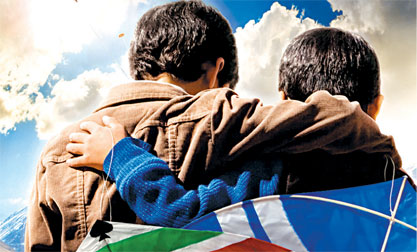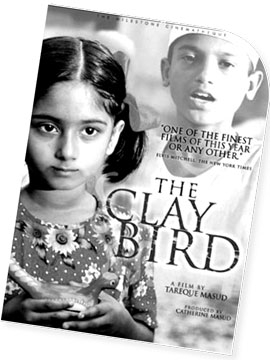SAARC cinema sermons
by Kalakeerthi Edwin Ariyadasa
''Harvie Conn has described film as a
'cultural mirror', a valuable reflection of contemporary attitudes
philosophies, values, lifestyles. Others such as Michael Medved, have
placed more emphasis on the idea of film as a former of culture. As I
see it, both emphases are true. The relation between film and culture is
a chicken-and-egg relationship. Film is of course a product of culture,
for, the makers of films are people of their own time.
- John M. Frame
The SAARC Cultural Centre in Colombo, has initiated a praiseworthy
move, to user in a propulsive dialogue among the members of the SAARC
Community.
The 27 year-existence of SAARC, has been distinguished by almost
daily discussions between officials, on momentous issues.
 These near ritualistic talks among those in the hhgher echelons of
SAARC official hierarchy are deeply impactful in ensuring SAARC's
strength and well-being. These near ritualistic talks among those in the hhgher echelons of
SAARC official hierarchy are deeply impactful in ensuring SAARC's
strength and well-being.
Over and above that, it has always been felt, that sustained meetings
of the mass minds of the SAARC region are dynamically essential to see
that the SAARC spirit of mutual understanding seeps down into the
recesses of the SAARC soul.
Cinematic way
In such a context, the SAARC Film Day, established by the SAARC
Cultural Centre in Colombo, paves a cinematic way, to enable the SAARC
masses to enter into an intimate discourse among themselves.
SAARC Cinema, can very well be characterised by SAARC people
(collectively nearly 2 billion of them) talking to each other, bereft of
inhibitions, in the universal language of cinema. These films reveal the
inner being of the member countries of SAARC and the cultural forces
that determine the attitudes dominating their lifestyles.
These monthly film days began (according to the alphabetical order)
with a cinematic work from Afghanistan.
Titled 'The Kite Runner' this film drama from Afghanistan surprises
you, in the first instance, by its cinematic idiom which initially seems
strange and unfamiliar, in terms of the staple film fare we are
generally used to. But, as the film progresses, it deftly sweeps you
along in its unrelenting rhythm.
Marc Forster's 'The Kite Runner', focusses, in its preliminary
stages, upon two young friends - Amir and Hassan. Amir is socially
superior to Hassan who lives in Amir's house. Hassan and his father are
traditional domestics, in Amir's residence. But, this social distance
does not prove a bar to the intimate friendship between them.
In this film 'the Kite' assumes an unusual significance. Kite flying
itself becomes an aggressive pastime. The central intention is to run
down rival kites, leading, at times, to violent encounters. In one such
encounter Hassan is brutally assaulted by a gang of young thugs.
Unwillingly witnessing this heart-rending episode Amir suffers a deep
sense of shame. He resorts to a stratagem, that result in Hassan leaving
Amir's residence.
Impressive
Exhibiting an impressive discipline, the film avoids meeting
Afghanistan's military turmoils, head on.
Amir migrates to the US, and the shame that marred his childhood,
leaves his memory without a trace, to be revived in quite an unexpected
series of developments.
The childhood friendship, between Amir and Hassan is dexterously
recorded, dwelling with restraint upon the implicit emotion, without in
any way deteriorating to sensationalism.
The film is fictionally efficient - leading to a denouncement that
overwhelms the viewer with a series of surprises.
As the cinematic work moves along, various aspects of the culture in
which the events take place, receive emphasis, enriching the viewers
understanding of the social area, that comes within the focus of the
film.
 "The Kite Runner", does not, at any time, consider it necessary to
thus, make partisan comments, thus, adding substantially to its stark
impact. "The Kite Runner", does not, at any time, consider it necessary to
thus, make partisan comments, thus, adding substantially to its stark
impact.
"The Kite Runner" of Afghanistan is followed by "The Clay Bird"
(Mafir Moina) of Bangladesh.
"The Clay Bird" symbolises the yearning of the people, to soar into
Independence, leaving the ground, that shakes violently in the struggle
for Independence.
Director Tareque Masud daringly confronts, the helplessness of the
underprivileged villagers, who cling to views, unable to achieve freedom
from their grip.
The moment, we hear about Bangladeshi cinema, classic Director
Satyajit Ray invariably begins to dominate our mind. Director Tareque
Masud's cinematic subconscious would have undoubtedly felt the echoes of
Satyajit Ray's "Pather Panchali" when he was contemplating "The Clay
Bird".
But, in his "Clay Bird", director Masud is preoccupied with several
layers of cultural influences. There is, of course, the inescapable
imperative - poverty.
In "The Clay Bird" there are other layers - orthodox loyalty and
liberal rebellion. Father Kazi, sends his son Anu to a Madrasa for an
austere religious discipline. But Anu, comes upon a form of life, that
he finds extremely difficult to handle - especially when he witnesses
fate of his intimate friend Rokon.
The film is admirable for its functional utilisation of various
aspects of rural culture.
The rhythmic recitals, accompanied by rudimentary theatrical gestures
communicate to the largely illiterate and underprivileged masses, the
basics of life's grammar. When everything is said and done - by
initiating the SAARC Film Day, the SAARC Cultural Centre has set in
motion a series of "SAARC CINEMA SERMONS', the end product of which,
will be a deeper appreciation of diverse cultural streams, that nourish
the SAARC lives. I would urge a seminar to follow each presentation to
take the profit of this series further afield.
|

